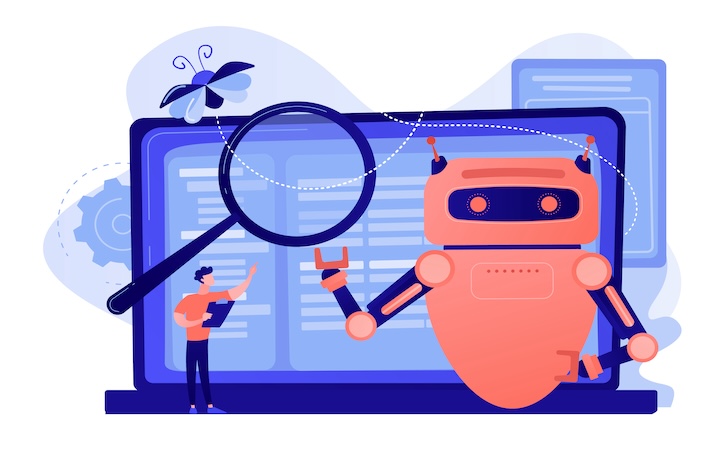Software developers have historically relied on traditional testing cycles to verify the functional validity and performance of their applications. However, as the software market becomes more competitive, there is a growing need to perform complex software tests within an accelerated time frame. It is only through reliable and continuous testing that developers can ensure that the quality of their products meets industry standards upon release. This is where AI-based test automation tools can provide a reliable framework for running and maintaining successful software tests in a fast-evolving development environment.
As AI and ML algorithms become a part of modern testing cycles, developers are looking for foolproof ways to make automated testing tools a part of their SDLCs. As a consequence, there is a new market of AI-based automation testing platforms with a range of features that make life easy for testers and developers.
What are the advantages of using AI test automation, and how can it impact the success of a software development project? Further, what are some trustworthy features and tools that can support AI integration into software testing? Read to find out!
Why we need AI Testing Tools
AI-based test automation tools leverage artificial intelligence and machine learning to enhance the testing process of software applications. AI-driven tools are utilised to automate common software testing tasks such as test case generation, test execution, reporting, and analysis of results. By harnessing AI capabilities, these tools help testers improve test coverage, and enhance test efficiency, while simultaneously reducing manual effort and testing time frame.
AI testing tools are becoming popular among modern software testers because of the following reasons:
- They ensure the reliability and accuracy of results by applying pre-determined algorithms to test cases.
- They help optimise testing by accelerating test creation, expanding test coverage, and reducing test maintenance efforts.
- They offer robust and pre-verified AI models that can be adapted to the evolving needs of testing cycles over time. AI test automation tools are easier to scale and customise in sync with an SDLC.
- They provide advanced features such as object recognition, self-healing, and visual testing to improve the overall software testing experience.
Benefits of Using AI-Based Testing Tools in 2024
Automation AI tools can greatly improve the performance of software testing cycles. Here are five key advantages of using artificial intelligence in application testing:
- Increased Efficiency
AI-based algorithms help improve the efficiency of software testing by enabling faster test case generation, execution, and analysis. They also help stakeholders improve their decision-making processes, and reduce the time-to-market for software releases.
- Better Test Coverage
AI-powered tools can improve test coverage by providing a quicker and easier method for generating comprehensive test scenarios. Machine learning algorithms can be applied to specific testing tasks such as error detection, result analysis, and identification of functional defects which may get overlooked by manual testing alone.
- Improved Accuracy
Test automation AI tools can study patterns and detect anomalies in test results more accurately than traditional testing methods. This makes them especially effective in software testing cycles which can benefit from detail-oriented analysis and quick feedback. Machine learning algorithms have also proven effective in reducing false positives or negatives during defect detection, leading to better reliability of test results.
- Cost Saving
AI-based automation methods can reduce the resource base needed for successful software testing, leading to cost-saving for companies. Automation of repetitive tasks results in decreased necessity of manual intervention during test execution. This ultimately leads to saved time and lower labour costs in the long run.
- Increased Adaptability
AI algorithms can efficiently adjust testing strategies to meet the evolving needs of a development project. This makes them especially effective in handling agile application testing scenarios that require more flexible test execution models. Consequently, AI-based testing methods are suitable for generating consistent results in dynamic software development ecosystems.
Key Features of AI Augmented Testing Tools
Here are the main features that define AI-augmented testing tools:
Intelligent Test Generation
AI-based automation tools can generate new test cases based on code changes, historical data, and evolving software requirements. This makes them effective in ensuring comprehensive test coverage while reducing manual effort at the same time.
Self-Learning Capacity
AI in QA testing can use machine learning algorithms to improve testing processes over time. They can study the software development cycle, and previous testing histories to adapt and learn from past experiences. This leads to continuous integration of test feedback to enhance the efficiency and effectiveness of test execution.
Dynamic Testing
AI automation features can dynamically adjust test suites and models based on the changing requirements of a project. Machine learning algorithms can evolve in sync with the development of software, and modify its test cases to match the changing priorities of a project. Development teams apply automated AI models to optimise test execution and maintenance of dynamic testing cycles.
Predictive Analysis
Machine learning algorithms can leverage historical test data to predict potential defects and errors in a developing software project. This allows testers to detect performance issues and areas of risk in the early stages of software development, enabling protective defect prevention and mitigation.
Integration with Complementary Technologies
AI automation testing tools can seamlessly integrate with other AI technologies to enhance test creation and execution. It is common for AI platforms to provide integrated features such as natural language processing for analysis and test case generation, object recognition and visual interfaces for UI testing, and error detection modules for identifying functional inefficiencies.
Common Challenges with Automation AI Tools
The adoption of AI-driven test automation tools can be a complex task for testers who are accustomed to using traditional software testing practices. Here are the four most common challenges of applying AI-based test automation:
Availability of reliable data
AI test automation tools depend on the availability of high-quality and diverse datasets for effectively training their algorithms. It is often difficult to obtain clean and valid databases for many niche domains and industries, leading to challenges in developing accurate ML models.
Algorithm Bias
AI algorithms are usually trained using a limited dataset, and follow a predefined framework in their functions. This may lead them to exhibit bias or produce results that are difficult to interpret as the software development cycle evolves. Inaccurate or misleading test outcomes are a common pitfall of algorithm biases creeping into AI automation tools.
Complexity and Scalability
Testing complex applications using AI automation can become increasingly challenging as the project evolves to introduce more sophisticated features or functions. Since AI-based algorithms are trained to handle a predefined set of tasks, it might be difficult for them to adapt to the growing intricacies of system interactions. Moreover, not all AI-based tools can handle larger-scale testing scenarios without requiring significant updates and re-training.
Skill Gaps
Implementing AI-driven software testing might require specialised skills and knowledge that are not readily available within a team. This means that companies might need to invest in capability-building before adopting AI-based testing tools. Resistance to learning new technologies or training might hinder developers from integrating AI tools into their existing workflows.
Best AI-Powered Test Automation Tools
Here is a selection of AI-driven Test Automation Tools that provide reliable testing capabilities:
TestSigma
TestSigma is an AI-powered testing tool that allows testers to create automated tests using natural language processing. It is a cloud-based platform that offers a fully-fledged testing environment without requiring installation or setup. Its versatile toolkit provides features such as automated healing, scheduling, and report customization for a seamless testing experience.
Mabl
Mabl offers a powerful intuitive CUI interface and AI testing capabilities for fast-growing development projects. It has a reliable low-code test builder which can be scaled easily to support high-velocity testing for busy teams. It is popular for providing end-to-end testing frameworks that enhance stakeholder collaboration across different phases of an SDLC.
Testim.io
Testim.io uses machine learning algorithms to execute automated tests on a variety of platforms and browsers. It offers a vibrant activity dashboard which is perfect for third-party integrations, and software maintenance needs. It is a popular platform for AI-powered UI and functional end-to-end tests. It also supports API testing, activity tracking, and collaboration features for agile development teams.
Functionize
Functionize is a popular AI test automation platform that leverages both AI and ML features to create powerful test execution cycles. It eliminates the need for creating repetitive test scripts and offers an easy-to-understand interface that fosters collaboration between testers, developers, and business analysts. It offers an intelligent platform for creating end-to-end tests for complex and fast-evolving software.
Avo Assure
Avo Assure is an intelligent test automation platform with a range of powerful AI-backed features that can transform your software testing experience. It utilises an efficient, no-code test generation interface that lets testers build and execute fully-fledged application tests with ease and accuracy. Moreover, its toolkit is compatible with agile testing methods, with seamless cross-platform integrations and flexible test customisations.
Experience the Power of AI-driven Automation Testing with Avo
AI-based automation can greatly enhance the speed, accuracy, and coverage of software tests. Avo Assure’s intelligent testing platform offers a smooth and dependable toolkit to integrate automated AI models into software testing cycles. Avo’s no-code test case generator, combined with continuous test execution, efficient test maintenance, and data-driven automation features create a powerful toolkit for modern testing needs.
If you are a tester who is looking to improve their software testing outcomes with minimal effort, try Avo Assure now!

